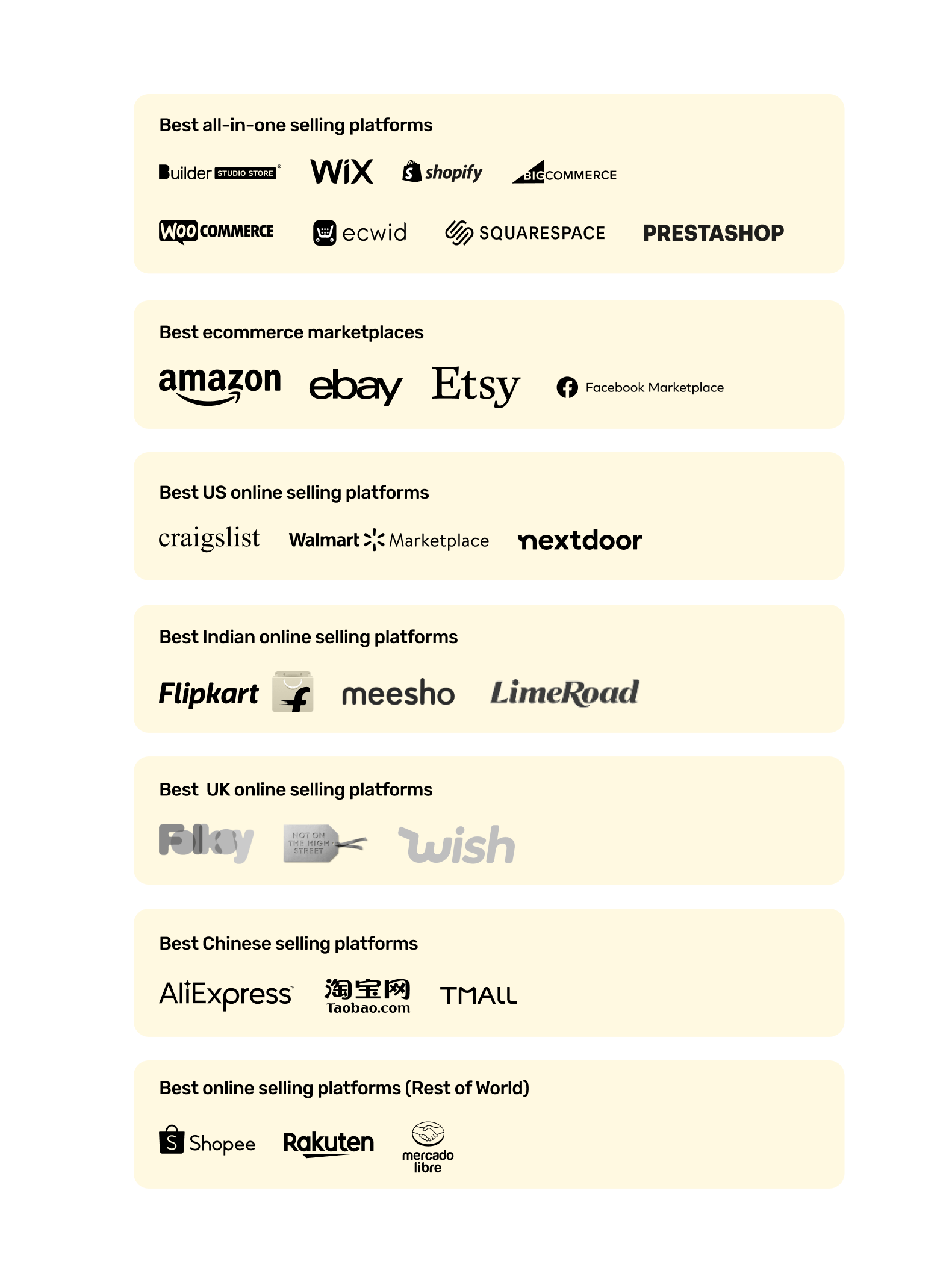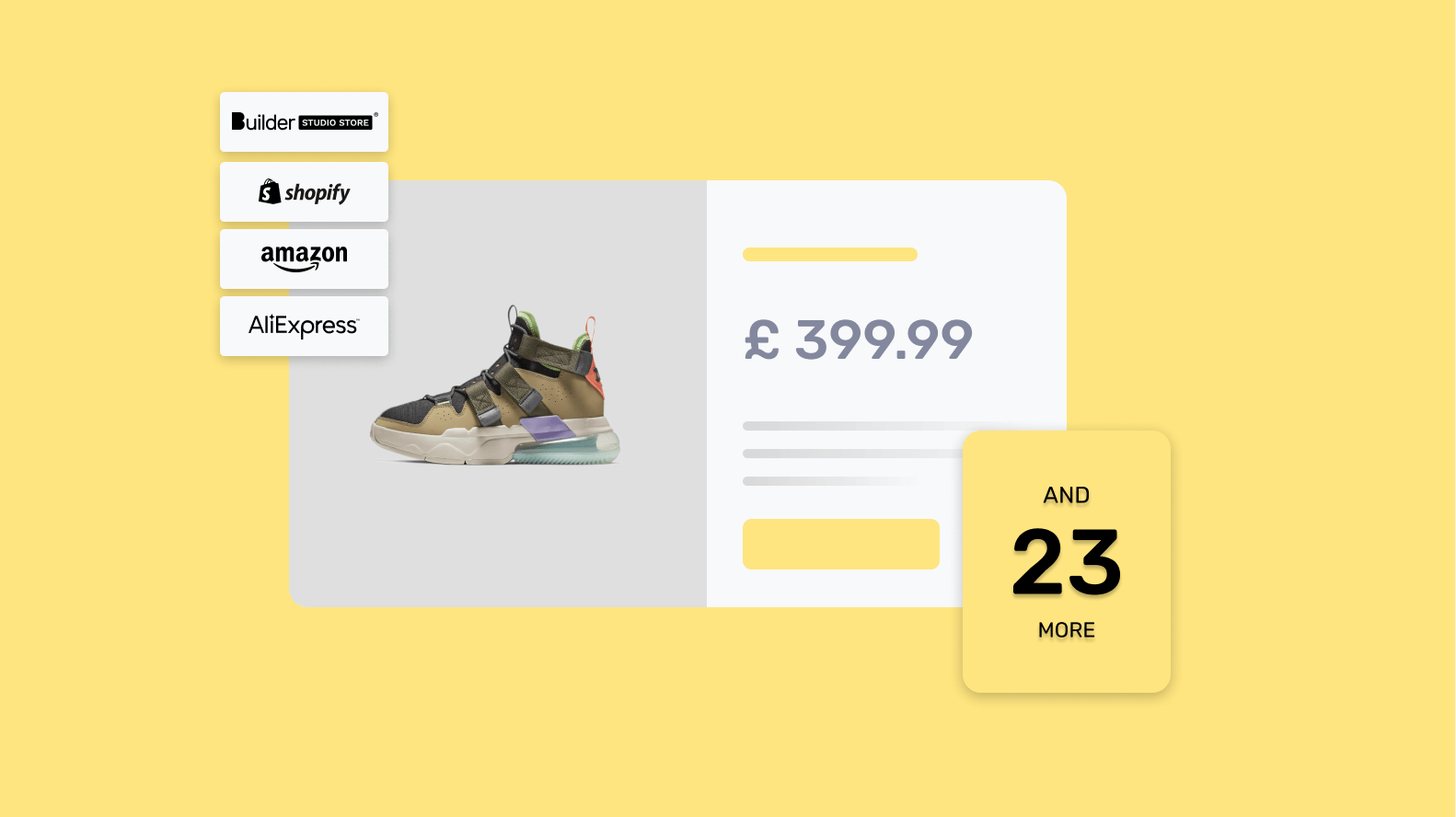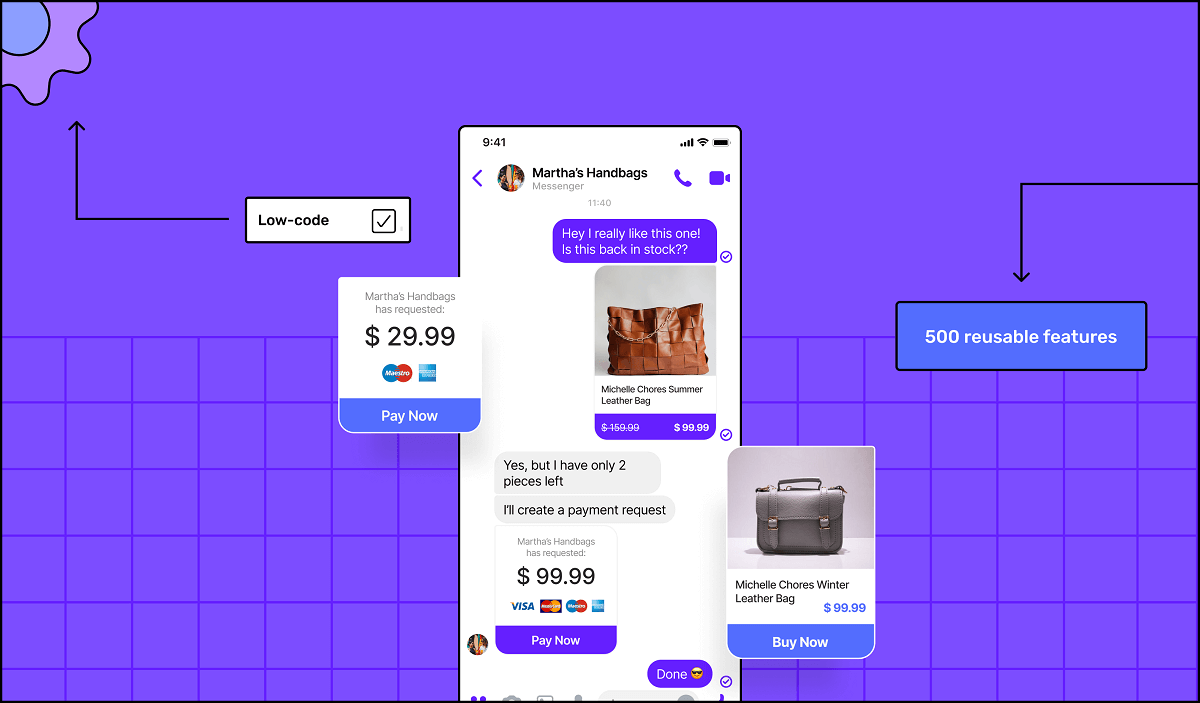Finding an online platform to help you sell online is a bit like choosing washing powder at the supermarket.
You’re looking at 50 things that do pretty much the same thing. You’re stressing out because it’s almost impossible to make the right decision. And as a result, you want to abandon ship, change into your slacks and binge watch trash TV.
The purpose of this blog is to help you avoidthat situation. But more importantly, it’s about helping you build an ecommerce store in a way that suits you.
How are we going to do that?
By splitting the best online selling platforms by type and region, before giving our verdict on the best providers in each category. Here’s a sneak peak…

What is an online selling platform?
The purpose of online selling platforms is to help businesses sell online. They may do this by helping vendors create apps and websites optimised for ecommerce, meaning they can make sales without a third party. Or they may provide a marketplace where vendors can list their products alongside other businesses.
When it comes to owning your own ecommerce store or selling on marketplaces, the first option allows you to list your products free from competition and keep all your profits. It also allows you to own your customer data and gain valuable insights into their needs and buying habits.
You can leverage these insights to increase customer loyalty and retention. But reaching the mass market will take longer, because you’ll need to create your own marketing and search engine optimisation (SEO) strategies to get business.
On the other hand, the second option allows you to reach the mass market faster and generate revenue quickly. The main downside is you’ll be reliant on your chosen platform’s respective algorithms. This means you’ll have shorter periods in the shop window, while you’ll also have to share your profits with your chosen marketplace.
As you won’t have access to customer data either, your ability to run targeted marketing campaigns will be limited.
Of course, there’s no right or wrong way to start selling online. Just bear this in mind as you review the lists below.
Why should you use an online selling platform?
As of October 2023, there were 5.3 billion internet users worldwide.
And you can bet your house that, at some point, each and every one of them will browse online with the intention of buying something.
Years gone by, reaching 99% of these users efficiently was impossible. For example, shipping products from the US to India would’ve been a logistical nightmare (as well as super expensive). Now, this is no longer the case.
With the rise of solutions like dropshipping, it’s no longer necessary for online stores to physically stock their products. This means they can reach new markets cost effectively and grow their addressable market.
So why use an online selling platform in this context?
Well, firstly because they equip you with the tools you need to sell online. An ecommerce app built with an online selling platform, for example, would include inventory management and order management as standard, as well as log-in pages, payment screens, baskets and more.
As a result, you can start making money as fast as possible, without building every functionality from the ground up.
And secondly, because many online marketplaces can take care of everything—from listing to marketing to delivery—vendors don’t need to shed blood, sweat and tears to get up and running.
Ultimately, whatever type you choose, the online selling platform is tailored to the 21st-century consumer. And without one, you could be left behind.
Below, you can review every type of online selling platform and decide which is best for you 👇
Best all-in-one online selling platforms
As we touched on above, all-in-one online selling platforms equip vendors with the tools they need to take control of their ecommerce businesses.
Aside from helping with app and website setup, all-in-one selling platforms may offer aftercare services to help maintain and develop your online presence.
This means your web and app infrastructure will be monitored, software will be updated and bugs will be fixed without you lifting a finger.
Here are the best platforms on the market right now 👇
Builder Studio Store - Best online selling platform for creating scalable online stores, fast
Builder.ai is one of the simplest and most reliable ways to take your business online. The platform's Studio Store offering allows you to build websites and apps with no coding involved.
All you need to do is share your app idea and Builder.ai provides you with a pre-packaged website and app to fit your needs, allowing you to start selling online in as little as two weeks.
You manage your online store from your own personalised dashboard, accessing sales data and customer insights to help you maximise your revenue.
You can also personalise your app and website with your branding, while seamlessly adding product inventory.
What’s more?
You Keep your code once your 24-month payment plan is complete, making it easy to add new features to meet emerging customer demands and scale your online store alongside your business. You can also migrate your online store to another platform if you want, as it doesn’t have avendor lock-inpolicy.
Studio Store’s pricing starts at $200. No matter how much revenue you generate or how many users visit your online store, you never share your revenue with us.
If you need any premium ecommerce features, you can buy the StorePlus expansion pack, or you can use Builder.ai’s premium platform, Builder Studio, to create custom features.
Pros
- 3.9 Trustpilot rating
- Can build web, mobile and desktop apps
- No vendor lock-in
- No revenue sharing
- Keep your code
- Guaranteed costs
- Limitless customisation
- One year of free aftercare
- 500+ advanced features
- Lego-like building blocks and human-assisted AI help to speed up the development process
Cons
- No free option
Want to build your online store?
Book a demoSpeak with one of our product experts today.
By proceeding you agree to Builder.ai’s privacy policy and terms and conditions

Shopify - Best ecommerce website builder for growing businesses
Shopify is a popular ecommerce website builder that powers thousands of websites and is known for its ease of use and built-in ecommerce tools.
The platform allows you to build online stores with fast loading speeds and offers more than 150 themes and customisable templates to choose from, though only a handful of them are free. Shopify also offers wide payment methods, third-party integrations, maintenance and 24/7 customer support.
Other than building you an online store, Shopify provides ecommerce tools including content creation, email marketing, analytics and sales and logistics which come in handy. However, you need to subscribe to some of these tools and functionalities at an additional cost.
The biggest drawback of using Shopify is how much it charges its customers. The platform charges 2% transaction fee on every sale you make on top of a third-party payment gateway fee of 2-2.9%. This said, you can avoid the payment gateway fee by using Shopify Payments, their proprietary online payments system.
Other than that, there are other hidden costs like maintenance costs, hosting services, customisation costs and plugin costs.
Another area that you must account for before locking on to Shopify is that the platform has a strict lock-in policy; in other words, you rent rather than own the code. This makes it challenging to migrate to another vendor if Shopify's services no longer meet your needs.
The platform's basic plan starts from $39/month.
Pros
- Ease of use
- Built-in ecommerce tools
- Wide payment integrations
- Fast loading speed
Cons
- 1.2 Trustpilot rating
- Limited free themes and features
- No ownership of code
- High transaction fees
- Expensive to scale
BigCommerce - Best online selling platform for B2Bs
BigCommerce is a highly scalable platform that allows you to build an online store without you having to code or have technical knowledge. The platform has a drag-and-drop builder for you to create and customise your online store quickly.
BigCommerce also has an app store where you can add extra features like marketing, online payment gateways, logistics services, accounting and more to your online store.
BigCommerce is a platform where you can scale your online store as it offers multichannel sales capabilities. However, because of all its extensive features, BigCommerce can be a challenging ecommerce platform for beginners.
The platform’s pricing plans are decided by the amount of revenue your online store generates. For example, a $29/month Standard price plan is limited to $50k yearly sales. The $79/month Plus plan is limited to $180k yearly sales. And the $299/month Pro plan for businesses with $400k yearly sales.
Pros
- Drag-and-drop builder
- Highly scalable
- No transaction fees
- Integrated payment gateways
- Great marketing and SEO tools
Cons
Wix - Best platform for companies with a casual ecommerce focus
Wix started out as a pure website builder but later added specific ecommerce features in the form of Wix Stores.
Wix Stores is a great choice for beginners as it helps them turn their hobbies into an online business. The platform provides hundreds of templates to choose from, where you can drag and drop features and move elements wherever you want on your online store.
Overall, Wix Stores provides all the essential features that an online store should have, like a shopping cart, secure payment options, search and filter options and more. But if you want a more robust online store that has fast loading times and handles complex functionalities, then Wix might not be a great fit for your requirements.
The platform's price plans start from $1/month and go up to $159/month.
Pros
- 4.6 Trustpilot rating
- Easy to use
- 500+ templates to choose from
- Drag-and-drop functionalities
- Built-in SEO tools
Cons
- Limited ecommerce capabilities
- Limited payment gateways and integrations
- Slow loading time for content-heavy pages
- No visitor analytics in the Lite plan
WooCommerce - Best online selling platform for WordPress fans
WooCommerce is a hugely popular open-source ecommerce plugin for WordPress. According to Statista, WooCommerce is the no.1 leading ecommerce software platform accounting for 38.74% of the market share.
So, if you're already running a WordPress website, WooCommerce Checkout can be a great platform to convert it into a basic online store. The plugin seamlessly integrates with WordPress and allows you to leverage its powerful content management system while managing your ecommerce operations.
You can customise your online store the way you want, but don't expect step-by-step support here. To properly leverage WooCommerce you need solid technical knowledge. Also, while the plugin itself may be free, you have to pay for your custom domain name, a hosting plan, an SSL certification and integrations.
Pros
- The standard platform is free and open-source
- Integration with WordPress
- Huge collection of free and premium plugins and design options
- More access to payment options
Cons
- 1.7 Trustpilot rating
- Need a WordPress website to start as WooCommerce is just a plugin
- Premium plugins are costly
- Large learning curve
- Need paid WordPress hosting
Squarespace - Best feature-rich online selling platform
Squarespace is an ecommerce website builder best known for its stunning templates and easy-to-use drag-and-drop builder.
The range of ecommerce features Squarespace offers makes it an attractive option, including product variants, integrated payment gateways, inventory management, out-of-stock alerts and much more. The platform also provides in-built tools to create ad campaigns, generate advanced reporting, manage content and SEO and more.
However, customisations are limited to the kind of template you choose. And you can only change colours, images and texts to align with your brand, as trying to add or move elements can be challenging.
While Squarespace also has a free personal plan, if you want to start an online store, then the platform offers three price plans for you. $23/month for Business, $27/month for Basic Commerce and $49 for Advanced Commerce. In the business plan, the platform charges a 3% transaction fee.
Pros
- Drag-and-drop builder
- Powerful built-in tools
- Payment gateway integrations
- No transaction cost for Commerce plans
Cons
- 1.8 Trustpilot rating
- The editing tool isn’t intuitive for beginners
- Upgrade to a premium plan for advanced features
- Business plan includes a 3% transaction fee
PrestaShop - Best platform for tight budgets
PrestaShop is an open-source platform that enables you to sell as many products as you want without paying additional transaction costs.
Although you need technical expertise to use this platform, it offers flexibility and extensive customisation options like integration of payment solutions, adding a shopping cart, cart recovery, updating physical products and more.
It also facilitates easy migration from other platforms like Shopify, Magento and 3dCart. Since it's a free platform, it becomes a strong contender for entrepreneurs and small businesses that want to have complete ownership over their content without using WordPress.
It’s important to note that although it’s a free ecommerce website builder, you still have to buy a custom domain name and also since it's self-hosted, setup may be challenging. PrestaShop comes with only one pre-installed theme and you have to subscribe to expensive third-party themes if you wish to have a different look and feel for your online store.
Pros
- Free
- Open-source
- Highly customisable
- Complete ownership of content
- Good availability of themes and modules
- Easy migration from other platforms
Cons
Ecwid - Best platform for social media integrations
Ecwid is a simple online store platform that allows you to leverage the power of multi-channel selling, including websites, marketplaces and social media and integrates seamlessly with them. The platform is user-friendly, affordable and open-source like some others on this list.
Ecwid offers both a free basic plan and advanced plans. In the free basic plan, you can create your store with minimal features and can sell up to 5 products. However, if you want to leverage social media and sell more products, then you need to buy the advanced plan at $82.50.
If you've got an existing WordPress website, then you can use Ecwid to create a widget and add it to your online store to allow customers to make a purchase. The platform provides a variety of customisable templates and designs to create a visually appealing online store.
Pros
- Free forever plan
- Usage of multiple channels
- Built-in tools for Google Analytics and Facebook advertising
- Simple user interface
Cons
- 2.8 Trustpilot rating
- Expensive for large numbers of products
- No support in the free plan
- Need a paid plan for basic features like chat or phone support and social media selling
Our verdict
As you can see, there are many all-in-one selling platforms to choose from. However, there's no one-size-fits-all solution.
So if you're an entrepreneur with good technical skills or a business with a team of developers, you may want to opt for open-source platforms like WooCommerce or PrestaShop. This'll allow you to take advantage of these platforms' customisation options
But for entrepreneurs and small businesses with limited coding skills, Studio Store by Builder.ai is an extremely competitive option to build your online store. Not only can you get online fast, but you can easily scale your online store with custom features in the future. Plus, the code is yours to keep, meaning you can migrate to another platform if you want to (once your payment plan is complete).
Want to build your online store?
Book a demoSpeak with one of our product experts today.
By proceeding you agree to Builder.ai’s privacy policy and terms and conditions

Best ecommerce marketplaces
Ecommerce marketplaces are so appealing to vendors because they take care of many of the logistics involved in online selling. As we mentioned in the introductory sections, they also give you access to a global market of active buyers overnight.
In theory, this allows vendors to focus less on admin while selling more. But because competition is incredibly high, you have little control over your listings and fees become problematic the more successful your store is.
Another problem inherent in ecommerce marketplaces is the inability to build brand loyalty. In other words, instead of returning to your online shop, buyers will return to the marketplace you sell on.
Here’s what you should know about the best ecommerce marketplaces around 👇
Amazon - Best all-round package provided by an ecommerce marketplace
Amazon isn’t just the best-known ecommerce marketplace. Alongside Apple and Google, it’s one of the best-known brands in the world.
This opens up millions of opportunities to sellers operating on the platform. At a cost.
With Amazon, you’re very likely to sell your digital products. It’s just a question of whether you can do that with margins that make sense to you.
See below for its full pros and cons:
Pros
- Fairly easy to set up as a seller, but you may have to meet specific requirements in certain categories
- Access to world-leading shipping logistics means customer experience is always on point
- Additional marketing costs are low because Amazon has its own search engine, making it easy for customers to find you
Cons
- The more successful your online shop becomes, the more significant Amazon’s fees become, with the company taking up to a 20% cut of your earnings
- Amazon owns the customer relationship, making brand building hard
eBay - Best generalist ecommerce marketplace
Once thego-to online marketplace, eBay has since been eclipsed by Amazon.
That said, there’s still plenty of value merchants can get from the platform, including the ability to sell any type of product (as long as it doesn’t break the law).
What’s more, you can get the best price for special items by auctioning them off and creating bidding wars.
Here are eBay’s detailed pros and cons:
Pros
- Easy to open a storefront on eBay, with plans starting at $4.95 per month.
- The better your performance standards are, the more you make, as eBay adds 4% onto final value fees from sellers who don’t meet minimum standards
Cons
- Once you exceed your 50 free listings per month, you have to pay $0.35 for each listing, even if the item doesn’t sell
- There is very intense competition on the platform, as there could be thousands of listings for similar product at any given moment
- Listings become less visible if you don’t offer free shipping for your item
Etsy - Best ecommerce marketplace for handmade and vintage items
Etsy is a handmade and vintage emporium. So much so that you’re restricted to selling items of this nature, along with craft supplies on the platform.
This makes it an ideal place for individual sellers to get their online selling journey off the ground and sell to a specialist market.
By the same token, as Etsy isn’t for everyone, your reach is more limited than it would be on Amazon or eBay.
Review the platform’s pros and cons below:
Pros
- Free to open a basic store
- Seller education and support includes step-by-step guides to selling, a seller handbook and guides on growth strategies, product description optimisation, search engine optimisation (SEO) and more
- Strong seller community allowing you to get advice and troubleshoot issues
Cons
- $0.20 listing fee plus transaction fees of 6.5% of the sale value
- Involves more marketing than Amazon and eBay to get noticed
Facebook Marketplace - Best ecommerce marketplace for local selling
Putting on a fire sale?
Then Facebook Marketplace is the one for you. While you’ll have to sell for modest prices, you can expect randoms in vans to turn up at your door within an hour of listing your products.
This local focus is what sets Facebook Marketplace apart, although you can technically ship nationally and globally.
Here are the platforms pros and cons in full:
Pros
- As a localised platform, you get nearby suggestions when you accept Facebook’s request to access your current location; you can also activate local pick-up options to increase speed and convenience
- No hidden charges or extra fees in most cases
- Individual sellers decide who pays the shipping charges
Cons
- Even more difficult to build a brand as you can’t set up a store
- No storage space provided, so scaling sales will be an issue
Our verdict
Choosing the right platform will mostly depend on your product offerings and where your priorities are.
For instance, if you’re into selling handmade and vintage items, then you should go with Etsy. Whereas Facebook Marketplace excels in localised selling.
Overall, though, Amazon provides the best all-round package. This is because it caters to a global audience, offers streamlined logistics and largely takes care of your marketing.
Best US online selling platforms
Territory specific online shopping platforms are important to consider alongside those with global reach. That’s because you can benefit from less competition while saving on logistics costs.
Here are the best the United States has to offer 👇
Craigslist - Best online selling platform for household goods
If you need to sell a refrigerator, TV or even a car, Craigslist is just the ticket.
Even though it’s less regulated and more prone to scams, Craigslist allows you to get rid of one-off items, albeit at low costs.
Here are the pros and cons you can expect from the platform:
Pros
- Free to set up an account and no monthly cost
- As a localised platform, you can cut down on delivery costs by arranging in-person pickups
Cons
- Higher risk and more vulnerable to scams than national or global platforms
- No automated posting, meaning you have to invest time into managing listings manually or use third-party automated posting software
Walmart Marketplace - Best major ecommerce marketplace with limited competition
Walmart is a global retail heavyweight and its ecommerce platform is growing in popularity.
That said, you can still benefit from less competition than you encounter on the likes of Amazon and eBay, while paying comparatively lower seller fees.
Here are Walmart’s main pros and cons:
Pros
- You only pay a referral fee when someone buys their product
- With only ~150,000 merchants, it’s far easier to stand out
Cons
- Commitment to low prices means lower profit margins
- Not all Walmart sellers qualify for its fulfilment services, so you may have to handle storage and shipping yourself
- Product listings happen on a first-come-first-serve basis, meaning you have to offer lower prices to be ranked above older listings
Nextdoor - Best for community minded sellers
Nextdoor is primarily a networking service for neighbourhoods, but it also offers you the chance to sell digital products in a similar way to Craigslist or Facebook Marketplace.
The platform’s pros and cons are listed below:
Pros
- As a hyper-localised platform, you can cut down on delivery costs by arranging in-person pickups
Cons
- Not solely a platform to list products, so you’ll have to compete with missing pet pictures and local events for attention
- Users may get annoyed at you clogging up the feed with listings
Our verdict
The United States is a very mature market when it comes to ecommerce 267 million people already using ecommerce. However, online sales still represent only a small share of all retail sales—about 15% in 2023.
With high market penetration and comparatively low sales, the US presents a huge opportunity for new players entering the market.
If you deal in household goods, Craigslist stands out thanks to its lack of monthly costs and ability to arrange in-person pickups.
If you’re seeking an ecommerce platform where there’s less competition by comparison to Amazon and eBay, you should go for Walmart Marketplace.
Best Indian online selling platforms
Now onto the best Indian online selling platforms around 👇
Flipkart - Best generalist Indian ecommerce marketplace
Alongside Amazon, Flipkart is India’s main online selling platform.
It even has a similar founding story, having originally been an online book seller before branching out into home goods, electronics and more.
Flipkart’s main selling point is that you can sell a wide range of goods there. But here are the pros and cons in full:
Pros
- Provide a range of order fulfilment options to suit different budgets
- Each plan comes with a profit margin calculator to ensure you pick the right one
Cons
- Online sellers on Flipkart have to pay four different fees to sell on their marketplace, including a commission fee (dependent on product category), shipping costs, collection fee and fixed fee
Myntra - Best Indian ecommerce marketplace for women’s fashion
The best thing about Myntra is that it allows you to tap into the sixth largest women’s apparel market in the world.
With more than 103 million monthly visitors, Myntra has revolutionised the fashion ecommerce market in India.
Despite being a specialist in women’s clothing, it also has a men’s offering, making it ideal for fledgling fashion brands in the Indian market to sell on.
Here are Myntra’s main pros and cons:
Pros
- You get full control over managing your catalogue, quantity, quality and sales of your products
- You get the exclusive opportunity to sell any unsold stock, provided it adheres to Myntra's rules and regulations
Cons
- You should be a registered business to sell on Myntra; this means if you’re an individual seller, then you can’t sell
- Myntra’s customer base is solely for the fashion industry
Meesho - Best Indian ecommerce marketplace with low fees
Many wholesalers, retailers and manufacturers like Meesho for one thing:
It doesn’t have a commission rate. This is in stark contrast to Amazon, which takes up to a 20% cut, however, Amazon also offers a better-rounded package.
See Meesho’s pros and cons below:
Pros
- No charge to register or list digital products
- 0% commission rate, no collection fee and penalties
Cons
- The platform doesn’t have strict quality checking procedures
Our Verdict
India’s ecommerce market is growing at an exponential rate and is expected to reach $188 billion in 2025. And if you want a slice of the pie, you should hop onto one of the platforms mentioned above.
If you’re a new seller, then Meesho is a great platform to start because of its 0% commission rate and no collection fee.
If you’re in the fashion industry and already have an established offline business, then Myntra should be your top priority.
However, if you want a platform that deals in a diverse range of goods and provides a diverse range of order fulfilment options, then you can’t go wrong with Flipkart.
Best UK online selling platforms
Here are some of the best online platforms available for UK-based sellers 👇
Folksy - Best UK Etsy alternative
If you’re a Brit looking to sell handmade items or original artwork, Folksy could be the online selling platform for you.
Its community vibe means sellers are well supported and many of them are also active buyers on the platform.
See below for Folksy’s pros and cons in full:
Pros
- Quick and easy to list products and start selling, plus it’s possible to move listings over from Etsy
- Strong customer support, with users frequently praising “community” feel
- Only 10,000 sellers on the platform, meaning there’s less competition
Cons
- Listing fees are charged per item, even when sold in bulk, meaning it’s not ideal for high-volume sellers
Not on the high street - Best selective UK ecommerce marketplace
Not on the high street is one of the more selective online selling platforms around, curating sellers, rather than letting merchants sell straight away.
While jumping through extra hoops is required, it could be worth it, given the fact that you’ll be one of a select few sellers in your category.
However, this privilege comes at a premium, as we explore in the pros and cons below:
Pros
- As sellers are curated, there’s much less competition than other marketplaces
- Seller education and support includes resources on business planning and search engine optimisation (SEO)
Cons
- 25% commission on sales plus a one-off joining fee of £199
- Filling in an application form is mandatory if you want to list on NOTHS, meaning you can’t start selling instantly
Wish - Best UK ecommerce marketplace for selling verycheap products
If you’re from the UK, you’ve seen the Wish memes. But that doesn’t mean they’re entirelyfair.
Sellers looking to shift lots of very cheap products at a reasonable markup will find a home on Wish, as will those with quirkier offerings.
Here’s what you can expect from the platform:
Pros
- No registration fees or monthly subscription fees
- No product listing fees
Cons
- Wish’s brand has a mixed reputation, with many people associating it with low-quality products
- You won’t be paid for an order until the customer has received it, which is problematic when you’re shipping long haul
- 15% commission fee
Our verdict
The UK is the most advanced ecommerce market in Europe. With the majority of people already using ecommerce, the country offers a diverse landscape of online selling platforms.
To start selling online, the choice of platform will mostly depend on the nature of the products you deal in and your overall goals.
Wish, known for its budget-friendly approach, is suitable for dealing with very cheap products. However, paying a 15% commission fee on low-cost products can be problematic.
Not on the high street, meanwhile, provides a unique selling environment that caters to those willing to go the extra mile to get listed.
Folksy, touted as the best UK Etsy alternative, is ideal for you if you focus on handmade items or original artwork.
Best Chinese online selling platforms
Here are the best online platforms the China has to offer 👇
AliExpress - Best Chinese platform for selling cheap items verycheap products
AliExpress is the home of very cheap homages to high fashion brands and many of its products are known to be strongly inspired by those that appear on other platforms like Etsy.
So if you’re a seller, providing value is definitely the name of the game.
AliExpress has also opened up to non-Chinese sellers, meaning you can get a slice of the pie.
Here are the platform’s main pros and cons:
Pros
- You only pay for the products you sell, other than that, there’s no fixed cost
- No need for a bricks-and-mortar store, reducing overheads on inventory and stock management
Cons
- General lack of control over your store means you may be reliant on slow or unreliable suppliers, which could affect your reputation
- Long and uncertain shipping times negatively affect the customer experience
- Low profit margins mean you need to sell in high volume to make a profit
Taobao - Best platform for the Chinese-speaking market
Engaging Chinese-speaking customers is a priority for most sellers in the ecommerce space. Why?
Because they’re part of the world’s largest ecommerce market. And Taobao could be your route into it.
Here’s what you can expect from the platform:
Pros
- Low fees when compared to other marketplaces
- Taobao is known as ‘the everything store’ and you can sell anything on it.
Cons
- Must register a company in China or partner with a Chinese enterprise to sell
- The website is 100% Chinese, meaning you’ll have to overcome a language barrier to sell
Tmall - The biggest online retailer in China
Tmall is one of the largest marketplaces in the world, where you can set up your own online storefront. With more than 666 million monthly users, Tmall has established a worldwide benchmark for online shopping.
On the platform, you can sell a range of products in categories like electronics, home appliances, FMCG, apparel and more.
See below for Tmall's pros and cons in full:
Pros
- Attracts a huge customer base, providing high reachability
- Offers international businesses an option to enter China
Cons
- Challenging to start selling due to strict requirements
- There is very high competition with Chinese and international businesses
Our verdict
With over $2.7 trillion in annual online sales, China is hands down the biggest ecommerce market in the world. Almost 52% of total retail sales achieved through ecommerce shows the level of penetration of the industry.
To start selling online in China, you cannot go wrong with any of the platforms mentioned above.
However, if you’re not from China and still want to sell your products there, you can go with AliExpress.
The Best thing about AliExpress is that it offers free product listings which minimises your overhead costs.
Best online selling platforms (Rest of World)
And last but not least, here are the best platforms from around the globe 👇
Mercado Libre - Best platform for the Latin American market
Another market many ecommerce players are keen to crack is Latin America. And Mercado Libre is a good place to start.
That’s because it has 174.2 million users in the region, serving as a marketplace where users can buy, sell and auction products.
Here are the platform’s pros and cons in full:
Pros
- Global Selling Program allows international sellers, such as those from the US, to list on the platform; you can also handle all processes in English
- Fulfilment and direct-to-consumer logistics options make shipping simple
- Sellers list and collect in USD, meaning you can avoid currency fluctuations
Cons
- High competition as there are over 11 million sellers on the platform
- You have to buy different types of listings, like classic and premium, to make your product stand out
Rakuten - Best platform for the Japanese market
Rakuten first became known to many Western countries when it started to sponsor FC Barcelona. And while its brand awareness has increased, it’s still only on the edge of most sellers’ radars.
But in Japan, Rakuten is trusted by a whopping 87% of the population.
With that kind of brand loyalty, exploring the platform is well worth it for ecommerce stores looking to break into the Japanese market.
Here are Rakuten’s main pros and cons:
Pros
- Stores are customisable, giving you the chance to build your brand
- Can sell to both US and Japanese markets
- Earning Rakuten Points and Coupons gives you the opportunity to make your store more visible
Cons
- Product and subscription fees alongside commission make Rakuten an expensive platform to operate on
- Rakuten doesn’t take care of inventory management, meaning you’re totally responsible for it
Shopee - Best online selling platform for the Southeast Asia market
Based out of Singapore, Shopee is one of the biggest online selling platforms in the Southeast Asia region. Originating as a C2C platform, Shopee expanded into the B2C segment and now sees more than 500 million monthly visitors.
Shopee’s main pros and cons are:
Pros
- Provides its own logistics and language-specific customer service
- “Shopee Guarantee”, a payment security service for both sellers and buyers
Cons
- High competition for new sellers as there are already a large number of sellers present on the platform
- Shopee has limited international reach, meaning you can’t sell to a global audience
Our verdict
If you’re a global seller, the choice of online platforms depends on the market you wish to target and the geographies where your business priorities are.
Mercado Libre stands out for its expansive reach if you wish to enter Latin America. If your business wants to target Japan, then go for Rakuten.
Meanwhile, you should choose Shoppe if Southeast Asia is in your sights.
Conclusion: Which type of online selling platform should I choose?
The key questions you need to answer are:
How realistic is it for my business to have assets? And how important is it for me to have those assets right now?
No matter the size of your business, the answer to both of these questions should be “very”.
Especially given how cost-effective Studio Store from Builder.ai can be.
This isn’t to say your decision HAS to be either/or.
You could open a marketplace store and create a bespoke website or app. But one thing’s for sure…
In the long run, being dependent on a third-party seller will hurt you in the pocket, which could harm your growth.
Want to build your online store?
Book a demoSpeak with one of our product experts today.
By proceeding you agree to Builder.ai’s privacy policy and terms and conditions

Disclaimer: The content of this article is provided for informational and promotional purposes only and is derived from publicly available data and industry sources. The views and opinions expressed herein represent those of the author alone and do not necessarily reflect the official policy or position of Builder.ai. This content is intended to offer insights and is not a definitive statement on the part of Builder.ai. Readers are advised to consider the promotional nature of the article and to exercise their own judgment in interpreting the author’s perspectives. Builder.ai accepts no liability for any actions taken based on the information provided or for any consequential, special, or similar damages, even if advised of the possibility of such damages.
Stories published by the editorial team at Builder.ai.













 Facebook
Facebook X
X LinkedIn
LinkedIn YouTube
YouTube Instagram
Instagram RSS
RSS


